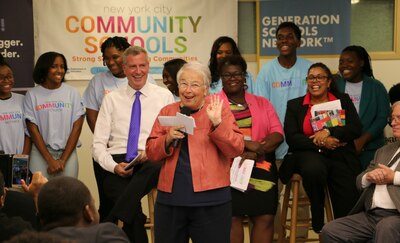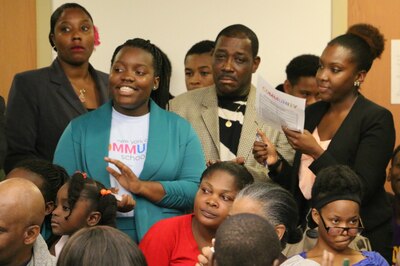An excited murmur pulsed through the line of parents waiting to enter Brooklyn Generation School for “family night” Wednesday evening.
The excitement echoed through the Canarsie building’s new family room and down a hallway where BGS students posed for photographs in new “community school” T-shirts and the principal scurried down the hall with a cell phone to her ear.
The mayor was coming.
Less than a year earlier, Mayor Bill de Blasio had unveiled a plan to improve 94 of the city’s lowest-performing schools by loading them with resources for students and staffers — an about-face from his predecessor’s controversial practice of closing and replacing troubled schools. Among the struggling schools that de Blasio promised to “move heaven and earth” to help was Brooklyn Generation.
But as the $400 million “Renewal” program rolled out, a gulf grew between the mayor’s rhetoric and the reality at BGS. Brooklyn Generation waited months for its first visit from program officials, its teachers received no new training or classroom help, and details about the city’s expectations remained elusive, as Chalkbeat found through several months of reporting at Brooklyn Generation during the Renewal program’s first phase.

Still, flickers of hope were visible. Teams of teachers continued trying to attend simultaneously to students’ personal and academic needs, and the school used new funding to hire teaching artists and counselors. Now, as those student services have expanded even further and the school’s graduation rate has shot up, Brooklyn Generation found itself Wednesday in an unexpected role: poster child for the potential of the mayor’s signature school-improvement initiative.
“Obviously, a Renewal school has some struggles,” Chancellor Carmen Fariña said alongside de Blasio during a town hall meeting with BGS staff and parents. “But what you have here is very special.”
The most visible progress Brooklyn Generation has made relates to its efforts to become a “community school” filled with enrichment activities, healthcare, and social services for students and their families.
Every school in de Blasio’s turnaround program must adopt that approach, which stems from the idea that students who suffer from ailments like asthma or depression, or who are bored by school, will do little learning. Brooklyn Generation has subscribed to that notion since its founding in 2007, and lately has demonstrated what is possible with the new funding and technical assistance provided by the Renewal program.
With its newly hired teaching artists, the school has added dance, drumming, photography, and comic-book-making programs this year, some of which students can participate in during the extra hour of classes that every Renewal school must now offer. By year’s end it will open a new mental-health clinic, and the city has promised it an on-site medical clinic within two years.
In July, more than a dozen students who had struggled with attendance last year participated in the school’s new summer camp, where they wrote about their identities, discussed current events, wrote motivational rap songs, practiced healthy cooking, and even tried stand-up comedy.
One attendee was Warren Hawkins, who is repeating the ninth grade after only making it to school 16 percent of the time last year, partly because he was coping with his mother’s illness. Counting the summer program and the school’s early start in August, Hawkins has yet to miss a school day this year.
“It was either that or be a failure in my life,” Hawkins said, adding that his goal now is to get a doctorate in math. (When de Blasio congratulated him for his attendance improvement during the town hall, Hawkins stood up and spun around in order to soak in the cheers.)
Transforming what happens inside classrooms is inevitably a slower, tougher undertaking, but the school is making some progress there too.
Teachers will soon attend a series of writing-instruction workshops, which staffers at some other Renewal high schools were invited to last spring. In August, the school saw its four-year graduation rate jump from 50 to 68 percent, bringing it up to the city average.

While the school’s seven-point boost in student attendance last year might be traced to the new services and counseling funded by the Renewal program, it is harder make that connection to the graduation rate, since the school received minimal academic support last year.
The school’s leaders say the gains are the product of several years spent trying to improve instruction and catch up struggling students.
“We’ve been working on this for years,” said Principal Lydia Colón Bomani. “It just happened now.”
Eventually, the mayor thanked the school and the crowd headed home.
Colón Bomani and her assistant principal, Louis Garcia, went back to her office and ate celebratory chocolate-chip cookies. As they did, Michele Hill, the school’s college and career director, stopped by to tell them about the twins, Elodie and Ismaelle Oriental.
The students had weathered their mother’s death of the start of last school year, but still maintained a grueling schedule of college-prep programs, enrichment activities, and homework that earned them spots at the top of their class.
During their summer break, the soon-to-be 11th-graders participated in a science program at SUNY Downstate Medical Center before traveling to Haiti to mark the anniversary of their mother’s death in her homeland. Last month, Hill, who has acted as the girls’ mentor and surrogate mother, took the twins and several classmates on a tour of Princeton University.
Hill explained that Elodie had caught up with the mayor as he was leaving the school Wednesday. As a security guard tried to block her, she called out to de Blasio that she planned to become a lawyer one day and would like to intern in his office. The mayor told the guard to give Elodie his contact information.
Colón Bomani yelped and clapped when Hill told her the story. Then Hill headed out, since she knew she would be staying late at the school again the next day — the twins’ 16th birthday — hosting a party for them.
“Good work,” Colón Bomani said.

